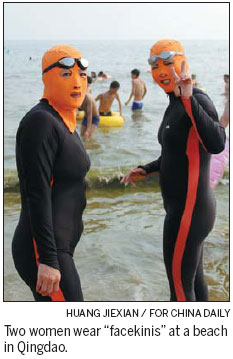Ski masks become sea masks
Updated: 2013-08-02 08:58
By Xie Chuanjiao in Qingdao (China Daily)
|
|||||||||||

While not as attractive as the sexy swimsuits from which it takes its portmanteau - quite the opposite, arguably - the "facekini" is intended to preserve women's looks.
But it has drawn a great deal of looks, too, as the ski-mask-like balaclavas used by swimmers in Shandong province's coastal resort city Qingdao have captured stares globally.
The nylon or cloth swimwear is meant to block the sun.
Locals say their look can be traced up to seven years ago. But nobody has patented them.
They're believed to be a DIY solution to water's magnification of sunrays by the city's middle-aged and older women.
Facekinis are now mass produced as protection against not only the sun but also to repel jellyfish and mosquitos. They retail for 15 to 40 yuan ($2.50-6.50).
They're sold nationally online but are especially prevalent at the 21 swimming beaches that crest Qingdao's 731 kilometers of coastline.
Women who wear them also often don full-body suits to fend off sunburn and even tans. In China, light skin is venerated.
Beijing native Li Ming says: "They look like special forces or marines on a landing operation. Or maybe like spiders. Either way, they're awesome but hilarious."
Local swimmers like 60-year-old Liu Chuanfang believe their use rises from the frequency with which their users hit the beach.
"I've lived here my whole life and can't live without the ocean. I swim before breakfast, and after lunch and dinner. I believe the facekini is a must to protect me from three hours a day of bright sunshine," Liu says.
Qingdao Evening News columnist A Zhan says: "It probably won't last and become real fashion because young girls tend to show their beautiful faces in the water."
Ma Weixin contributed to the story.
xiechuanjiao@chinadaily.com.cn
(China Daily European Weekly 08/02/2013 page26)
Today's Top News
List of approved GM food clarified
ID checks for express deliveries in Guangdong
Govt to expand elderly care
University asks freshmen to sign suicide disclaimer
Tibet gears up for new climbing season
Media asked to promote Sino-Indian ties
Shots fired at Washington Navy Yard
Minimum growth rate set at 7%
Hot Topics
Lunar probe , China growth forecasts, Emission rules get tougher, China seen through 'colored lens', International board,
Editor's Picks

|

|

|

|

|

|





